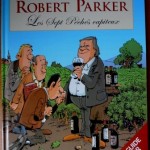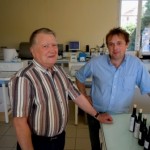New cartoon lampoons Robert Parker and the great wine critic takes it in stride (with photos) …
October 12, 2010
I just finished reading a 60 page comic book on the great American wine critic Robert Parker. It is called “Les sept péchés capiteux” and rehashes many of the arguments against so-called Parkerization brought up by the 2004 wine documentary Mondovino. Indeed, the comic book relies on but six sources for its material, which include a book by Mondovino creator Jonathan Nossiter… and one by Parker’s former translator Hanna Agostini – hardly friends of the great critic.
Decanter published my article about this comic book and what is most surprising perhaps is the way Robert Parker himself has reacted to it. In stride. The comic book is indeed very funny, but can be interpreted in many ways. In an e-mail reply to me, which arrived after decanter.com published my news brief, Michel Rolland – who is featured prominently in the comic – wrote:
J’ai lu la BD.
Drôle, bien romancée, l’intrigue est pleine d’humour, et documentée, toujours à charge bien entendu.
Je suis surpris d’une chose toutefois, ceux qui ont le plus intrigué avec Parker, qui ont obtenus les meilleures notes en moyenne, donc exécuté le style Parker, puisque Parker n’aime qu’un style de vin, ce sont JF et C Moueix, à travers leur homme de main, Dominique Renard.
Ils ne sont pas cités une seule fois, alors que DR rencontre Bob beaucoup plus souvent que moi, c’est lui qui lui a organisé tous ses voyages en Asie.
Alors pourquoi faut il toujours que l’information soit tronquée, parce que l’ on égratigne pas certain?
La drolerie de cette histoire est in contestable, quel domage de l’entacher de malhonnêteté intellectuelle, mais c’est le mal du journalisme de notre époque …
Basically, Rolland found it very funny, too, but decries its “intellectual dishonesty” because no mention, he said, is made of the Moueix group – hardly modernists – who are more in contact with Robert Parker than he is, he explained. So he notes the evident broadside against modernism in winemaking, including the Garagistes and Rolland’s own style.
So it is interesting to see how reactions vary among the “victims” (my decanter.com editor added that line about “victims” which I think should be in quotation marks!). American wine importer Jeffrey Davies took it most seriously, saying he found it not funny at all, while Jean-Luc Thunevin, writing on his blog, had a good laugh, he wrote, also saying that I do not understand French cartoons, because – in the end – the entire story was a dream Parker had. But I would say: sure, a dream, but the “story line” of the judgment constitutes most of the content, and Parker ends up drinking Riesling with his wife! So, I think there is an underlying – and critical – tone to the book, however satirical. This is highlighted in the notes by none other than La Revue de Vin de France director Denis Saverot, who writes in the preface: “It is undeniable that worldwide success of Bordeaux vinification, popularised by the grading system of Robert Parker, has led to a standardization of wine taste.” Strong words. But he denies that there has been an organised plot to do this, what is shown in the cartoon…
Which brings me to much time I spent this year interviewing the Boissenot father and son winemaking consultants in Lamarque. During our talks, much was said about modernity in winemaking as opposed to tradition. Serious discussions can be had about that subject, and my profile of the Boissenots will appear in a later issue this year of the excellent The World of Fine Wine magazine. For now, I would like to address certain issues in the modernity vs tradition debate…
First of all, Robert Parker is a hero to me. Just as Hugh Johnson is. Like other wine lovers, I trace my first infatuation to wine to reading Johnson’s wine books from the 1970s. I also recall adoring Parker’s notes. More so than his scores, especially lately when I think there has been an inflationary tendency, rendering 97s and 99s almost meaningless. What matters to me is how a wine tastes and the subjective taster in question. Of course Parker does like some big wines that I do not like. But he also likes elegant wines. Not as much as the aforementioned Johnson, to be sure. So, let’s take a step back and appreciate the contributions that Parker has made to the world of wine appreciation:
1. Passion. He has a real passion for wine and it shows in his notes.
2. Democracy. He has increased wine appreciation with a scoring system that can make sense to many people. That is undeniable.
3. Criticism. He is critical and pulls no punches for wines he does not like.
Having said that, I also share Hugh Johnson’s critique of Robert Parker, for certain wines. He put it eloquently in his book A Life Uncorked, which I would recommend to any wine lover:
“To me his numbers game was irrelevant. He could score any way as he liked, and I could enjoy my wine untroubled… We have different tastes. Parker emphasizes concentration, strength, density and ‘palate feel’. To him, viscous – of a red Bordeaux – is a term of praise.” Johnson goes on to say that it makes him “shudder” (I think that is a bit too much) and that “the wines Robert Parker prefers often seem to me to threaten headaches, and not only in their youth.” Again that last bit seems too much, but I think it is true that Parker likes rich and concentrated wines. Why not? There are some wines Parker scores relatively low (Figeac, for example) which I think are great. I, too, put more emphasis on freshness and elegance and less on rich concentration; hence a preference for Vieux Château Certan over Pavie, to take but one example. Or Canon over Pavie Macquin. Or Brane Cantenac over Kirwan (when Michel Rolland was at the wine consulting helm). Does that mean that one person is right and the other wrong? I think not. Let’s see how Pavie 2000 will age, for example. I have a bottle which I will open in 10 years, maybe 20… just to see how it would do against Canon 2000. Or even Belair!
One of my best times in Bordeaux was in the company of the Garagistes, with Jean-Luc Thunevin, in November 2007. I also spoke at length with Jeffrey Davies, and appreciated his response to my question: ‘Did not some people go too far with extraction, new oak, late harvesting?’ to which he replied: ‘How do you know how far too far is if you do not try’ or something to that effect. I respect the reply, and I respect the vision of the modernists. I may not agree with it, but I will not make a state’s case against it, either. As long as you can find a variety of different styles, I am happy. And let’s not forget that the modernists, from Rolland to Thunevin, shook up Bordeaux a bit and urged cleanliness in the vat room. These are not my words, but John Kolasa’s. And Kolasa is anything but a modernist, running both Rauzan Segla and Canon.
But what is interesting is the use of Emile Peynaud as a football: many modernists, including Davies, like to say that they studied under Peynaud and draw parallels with his call to pick later – and the criticism that he drew by traditionalists. But in my talks with Jacques Boissenot – a man who worked with Peynaud for many years, not merely ‘studied under’ him – I can safely say that the modernists may well have gone too far in some cases. At least for my taste! Anyway, you can read about that in The World of Fine Wine, which should publish my profile on the Boissenot father and son team in December this year.
Chrs, Panos




Hi Panos,
It’s refreshing to read such a clear headed, straightforward piece, written in a most reasoned fashion and absent any form of personal agenda. Both sides of this issue are represented and credit is given where credit is due, in my opinion.
Personally I find virtually any form of generalization a deal breaker in wine writing. When one generalizes regarding wine the writing becomes lazy and the logic tends to favor the preconception of the writer.
There is no black and white here, just a concise and thoughtful appraisal of the subject at hand. Well done!
Cheers,
Doug G.
[…] courtesy of Dr. Vino, Connections to Wine and Courage Factor. var addthis_pub = ''; var addthis_language = 'en';var addthis_options = […]